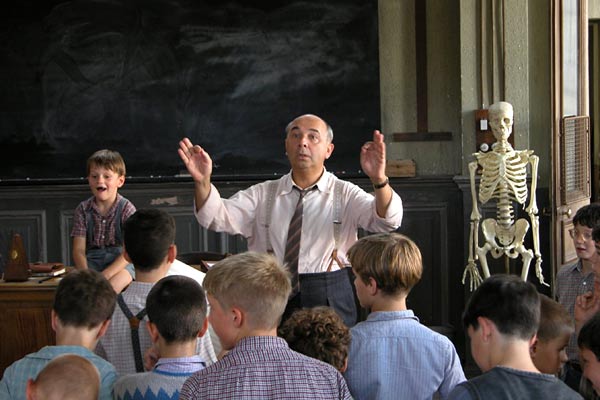Movie review by Greg Carlson
Based on the 1945 film “La Cage aux Rossignols,” Christophe Barratier’s “Les Choristes” (translated stateside as “The Chorus”) evokes plenty of other movies, from “Zero for Conduct” to “Mr. Holland’s Opus.” Told in flashback, the story transports the viewers to Fond de l’Etang, a strict boarding school for young boys of the deeply troubled and often orphaned variety. A single, middle-aged teacher named Clement Mathieu (Gerard Jugnot) takes a job at the grim institution, where he is immediately shocked by the deplorable, heavy-handed approach of the vile headmaster.
Mathieu talks his boss into letting him start up a choir, and before you can warble “Kyrie Eleison,” the discipline-challenged moppets are singing together in perfect harmony. Among the youth gone wild is Pierre (Jean-Baptiste Maunier), a sullen pretty boy with a huge chip on his shoulder. Pierre’s mother (Marie Bunel) is attractive and single, and the boy must endure the kinds of comments one would expect from the coarse inhabitants of his dormitory. Primarily to alleviate concerns that Mathieu might have an unwholesome interest in his charges, the script finds time for the teacher to pine away for Pierre’s mom. Fortunately, Jugnot’s fine performance tempers some of the obviousness of this plot device.
“Les Choristes” quietly sidesteps the issue of pedophilia (it is brought up, and then immediately dismissed), but the movie might have been stronger had Barratier and his co-screenwriter Phillipe Lopes-Curval chosen to explore it. As it is, “Les Choristes” often strains to fill time, and resorts to a half-baked subplot concerning the arrival of a thuggish bully who threatens the other boys and indirectly places the future of the choir in jeopardy. An arresting scene in which the young tough is brutally punished by the cruel headmaster, however, hints at the frustration supported by the theory that corporal discipline merely breeds violence.
“Les Choristes,” like “Dead Poets Society,” puts its faith in the idea that one great teacher can inspire creativity, gratitude, and a love of learning in the hardest-hearted would-be scholars. Like the long parade of films in the tradition of super-educators, “Les Choristes” adheres closely to the formulaic elements that are demanded: battles with administrators (here thinly veiled as a symbol of fascism versus democracy), a moment of near hopelessness, and the obligatory triumphant performance or demonstration of skill learned at the feet of the doting professor. None of the clichés are over the top, but missing are the unique and distinguishing details that would elevate the film to a higher rank.
A smash hit in France, “Les Choristes” dispatches its tale with enough warmth and charm to please most audience members. It doesn’t hurt that the singing is provided by a stunning choir, the Petits Chanteurs de Saint Marc, or that director Barratier applies the tunes early and often. Enjoyment of the movie will depend to a large extent on how much one cares for old-fashioned yarns in the tradition of “Goodbye, Mr. Chips.” In addition to the music, the solid production values (particularly the gloomy, dank keep where the action is set) help to make the film easy to watch, even when it practically insists on tearful sentimentality.
